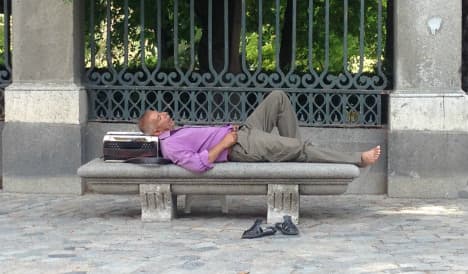Rajoy vows to turn back the clocks in Spain

Spain's acting Prime Minister has said moving Spain back to Greenwich Mean Time would result in a “better quality of life” for Spaniards.
Spain’s acting Prime Minister has said moving Spain back to Greenwich Mean Time would result in a "better quality of life" for Spaniards.
Spain is renowned for its late mealtimes - lunch at 2pm and dinner well after 9pm when the rest of Europe sticks to its midday and 7pm staple.
But the late timings are not restricted to mealtimes; many Spaniards do not finish work until around 9pm, which many believe has a negative effect on their work-life balance.
Now, the country’s acting Prime Minister, Mariano Rajoy, has pledged to do something about it and change back the clocks, putting Spain in line with Portugal, its own Canary Islands and the UK on Greenwich Mean Time (GMT).
Rajoy promised this weekend that if he is the next Prime Minister of Spain, he will make sure the working day ends at 6pm by turning back the clocks in line with GMT.
It would put an end to the two-hour lunch break when many Spaniards sneak in an afternoon nap.
Spain’s acting Prime Minister said that he would turn back the clocks in order to "adapt to the needs of the country", with reconciling work and family life being the ultimate goal.

Map: Lmbuga/Wikimedia
The move was welcomed by leaders of the opposition parties, including Ciudadanos, which included turning back the clocks in its election manifesto.
The party believes that a change in time zone could increase productivity, putting an end to Spain's culture of long working hours, and with it the traditional two - three hour lunch break.
The change would make sense for Spain, which geographically lies further west than London, yet runs on the same time as the Serbian capital Belgrade, 2,500km (1,550 miles) to the east (all of Spain except for the Canary Islands, which remain within GMT).
Spain has not always been on Central European Time; it followed GMT until 1942, when dictator General Francisco Franco turned the clocks forward in solidarity with his allies, Nazi Germany.
By turning them back, Rajoy would help millions of Spaniards achieve a better work-life balance, as well as finally getting rid of a 70-year-old Francoist legacy.
Spain is poised for a new general election in June following months of political instability with none of the political parties yet managing to form a pact to govern in the wake of inconclusive results last December 20th.
Comments
See Also
Spain’s acting Prime Minister has said moving Spain back to Greenwich Mean Time would result in a "better quality of life" for Spaniards.
Spain is renowned for its late mealtimes - lunch at 2pm and dinner well after 9pm when the rest of Europe sticks to its midday and 7pm staple.
But the late timings are not restricted to mealtimes; many Spaniards do not finish work until around 9pm, which many believe has a negative effect on their work-life balance.
Now, the country’s acting Prime Minister, Mariano Rajoy, has pledged to do something about it and change back the clocks, putting Spain in line with Portugal, its own Canary Islands and the UK on Greenwich Mean Time (GMT).
Rajoy promised this weekend that if he is the next Prime Minister of Spain, he will make sure the working day ends at 6pm by turning back the clocks in line with GMT.
It would put an end to the two-hour lunch break when many Spaniards sneak in an afternoon nap.
Spain’s acting Prime Minister said that he would turn back the clocks in order to "adapt to the needs of the country", with reconciling work and family life being the ultimate goal.

Map: Lmbuga/Wikimedia
The move was welcomed by leaders of the opposition parties, including Ciudadanos, which included turning back the clocks in its election manifesto.
The party believes that a change in time zone could increase productivity, putting an end to Spain's culture of long working hours, and with it the traditional two - three hour lunch break.
The change would make sense for Spain, which geographically lies further west than London, yet runs on the same time as the Serbian capital Belgrade, 2,500km (1,550 miles) to the east (all of Spain except for the Canary Islands, which remain within GMT).
Spain has not always been on Central European Time; it followed GMT until 1942, when dictator General Francisco Franco turned the clocks forward in solidarity with his allies, Nazi Germany.
By turning them back, Rajoy would help millions of Spaniards achieve a better work-life balance, as well as finally getting rid of a 70-year-old Francoist legacy.
Spain is poised for a new general election in June following months of political instability with none of the political parties yet managing to form a pact to govern in the wake of inconclusive results last December 20th.
Join the conversation in our comments section below. Share your own views and experience and if you have a question or suggestion for our journalists then email us at [email protected].
Please keep comments civil, constructive and on topic – and make sure to read our terms of use before getting involved.
Please log in here to leave a comment.